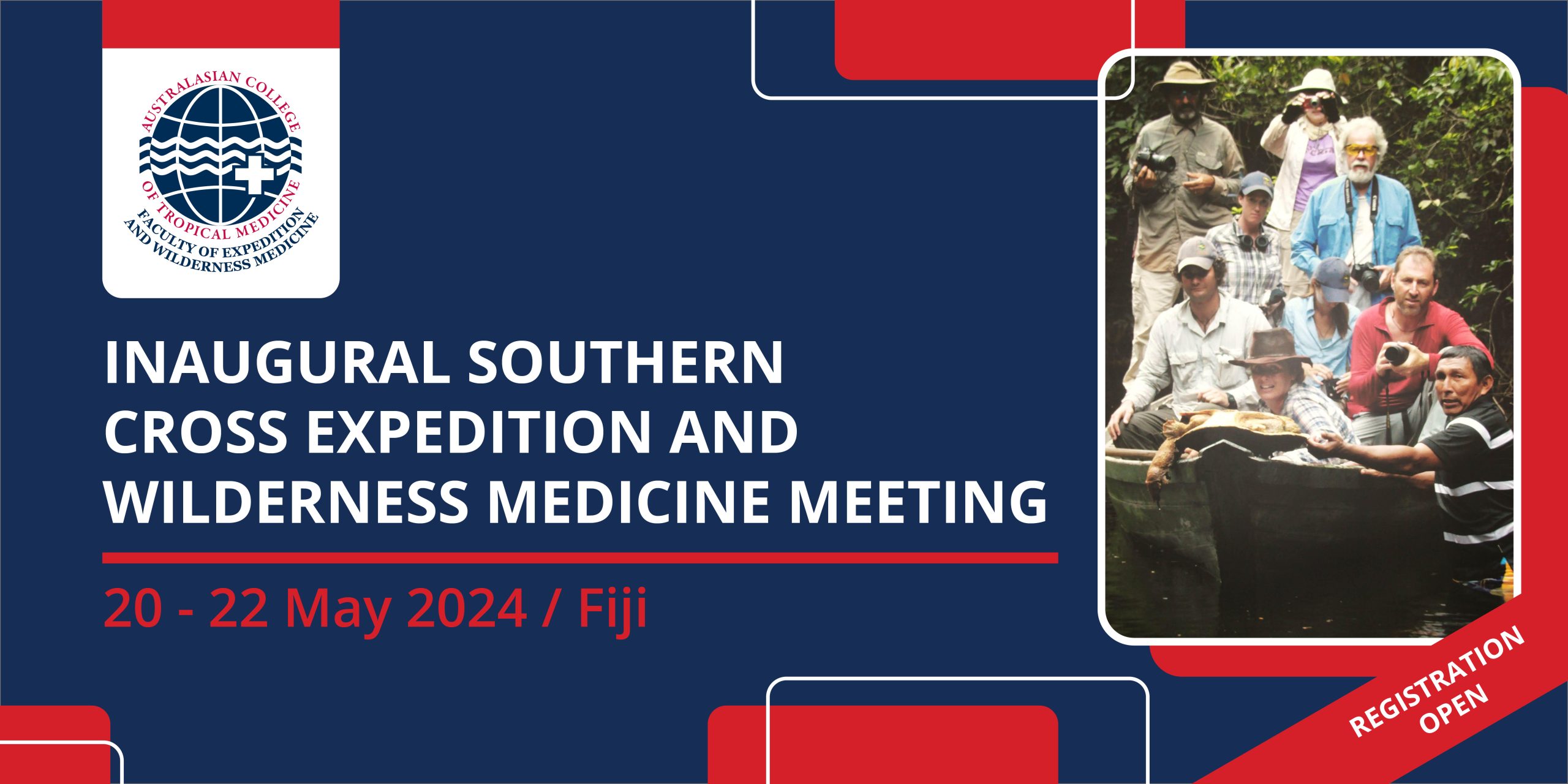
The overall purpose of the Faculty is to be the pre-eminent professional organisation in Australasia supporting expedition and wilderness medicine.
BRIEF HISTORY
The Faculty was initially established by the ACTM on 14 November 2009 as a Sub-Faculty of the Faculty of Travel Medicine. On 21 February 2011, the ACTM approved the establishment of a joint Faculty of Expedition and Wilderness Medicine to operate in conjunction with the Faculty of Travel Medicine.
The launch of the Faculty of Expedition and Wilderness Medicine (FEWM) was the culmination of a series of meetings of a Working Committee of the Sub-Faculty of Expedition and Wilderness Medicine, which was formed by health practitioners drawn from the broader membership of the College and the College Council with an interest in expedition and wilderness medicine.
It was the first named Faculty of Expedition and Wilderness Medicine established globally, but recognises the significant contributions over of other major international groups, such as the Royal Geographical Society, the Wilderness Medicine Society (US), the Faculty of Pre-Hospital Care of the Royal College of Surgeons of Edinburgh and other groups.

Inaugural Southern Cross Expedition and Wilderness Medicine Meeting
20 – 22 May 2024 / Fiji
Please join us in Fiji for the Inaugural Southern Cross Expedition and Wilderness Medicine Meeting. The meeting will be held over 3 days from 20th to 22nd May 2024 at Outrigger Fiji Beach Resort.

View our latest Faculty webinar:
“What freezings I have felt, what dark days seen”
Dr Natasha Behrendorff

SCOPE OF EXPEDITION AND WILDERNESS MEDICINE
Expedition medicine, known in North America as ‘wilderness medicine’, has been described as one of the four supporting pillars of travel medicine with the other areas being prevention of travel related disorders (through advice, vaccination and prophylaxis), insurance medicine and aeromedical retrieval. The Oxford Handbook of Expedition and Wilderness Medicine defines the field as being:
“concerned with maintaining physical and psychological health under the stresses and challenges of expeditions. Its aim is to encourage adventure but to attempt to minimise the risk of trauma and disease by proper planning, preventive measures such as vaccinations, sensible behaviour and acquisition of relevant medical skills. Responsible attitudes towards the environment and the welfare of the indigenous peoples in the areas of travel are also of great importance.”
The Joint Faculties, FTM and FEWM, will therefore have natural synergies.
The aims of the Faculty are to:
- Act as a professional faculty in expedition and wilder- ness medicine, providing recognition as well as accreditation and re-accreditation, where appropriate, in expedition and wilderness medicine;
- Assist in the production of policy documents on expedition and wilderness medicine;
- Act as a reference body on expedition and wilderness medicine for the College;
- Act in the best interests of expedition and wilderness medicine, by promoting the specialty to all intending expeditions and overseas travellers to remote regions where specialist medical care may be needed;
- Formulate a expedition and wilderness medicine section within College Annual Scientific Meetings;
- Develop curriculum guidelines for and assist in delivering training courses in expedition and
- wilderness medicine;
- Promote expedition and wilderness medicine as a specialty area;
- Network with other appropriate global organisations in expedition and wilderness medicine;
- Apply for grants and seek sponsorship for College programs relating to expedition and wilderness medicine;
- Develop and referee publications in expedition and wilderness medicine on behalf of the College;
- Maintain an internet site for the College on expedition and wilderness medicine;
- Seek accreditation for expedition and wilderness medicine programs organised by the College with other professional accreditation agencies;
- Recognise members who have made a significant contribution to expedition and wilderness medicine through the College Awards and Honours program.
For full details on the Faculty Profile, click here.

MEMBERSHIP
To join the Faculty of Expedition and Wilderness Medicine please click here Membership will be drawn predominantly but not exclusively from generalists and specialists in the medical, nursing and paramedical professions in the private and public sectors. The FEWM is actively seeking to encourage membership amongst those working in expedition and wilderness medicine and provides professional recognition through different grades of membership, which reflect the level of training and experience of applicants, as well as their commitment to continuing education. Professional grades of membership include Fellow, Associate Fellow, and Member of the FEWM of the ACTM with relevant post-nominals being FFEWM ACTM, AFFEWM ACTM, and MFEWM ACTM. There is also a non-professional grade of Associate, which carries no post-nominal entitlement.
For information about the Faculty’s membership levels, click here.
FACULTY LEADERSHIP
Dean: Professor Marc Shaw, BMedSc, MBBS, DipTravelMed, DrPH, FRNZCGP, FACTM, FFTM FFEWM ACTM, FFTM RCPSG, FRGS
Deputy Dean: Jeff Ayton, MBBS, MPH&TM, FACRRM, FACTM, AFFTM FFEWM ACTM, DRANZCOG DA (UK)
Joint Faculties Registrar: Professor Peter Leggat, AM, MD, PhD, DrPH, FAFPHM, FFPH RCP(UK), FPHAA, FACTM, FFTM FFEWM ACTM, FFTM RCPSG, FACAsM, FRGS, FRAS, FAICD, FACE, FISTM, HonFFPM RCP(UK), HonFACTM, HonFFTM ACTM (Acting)
